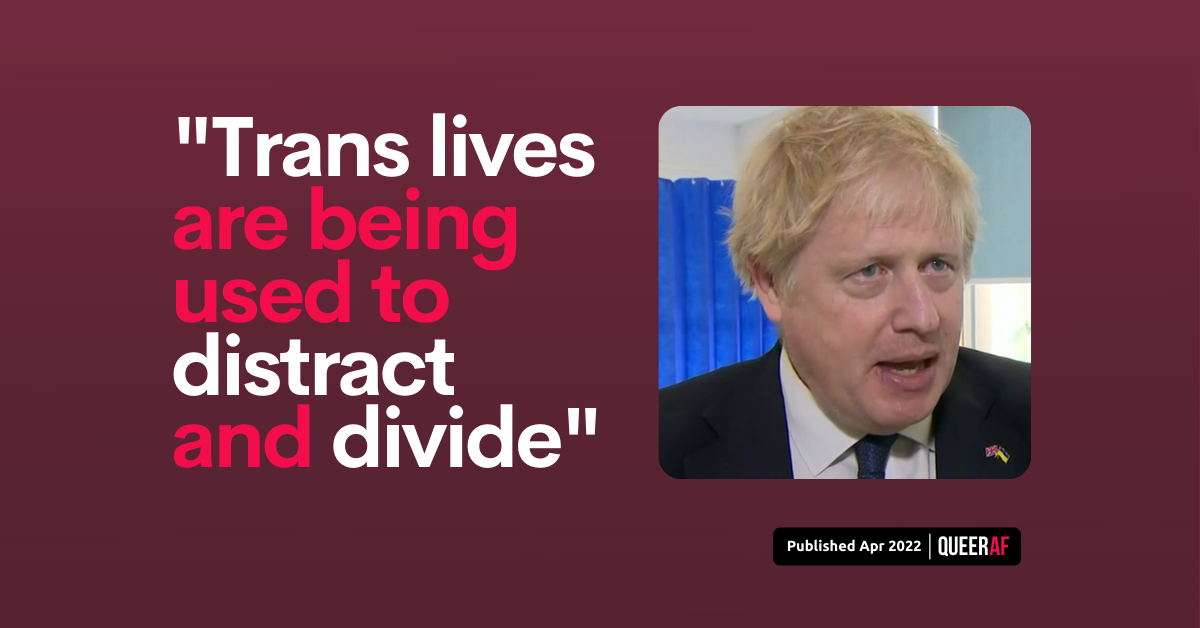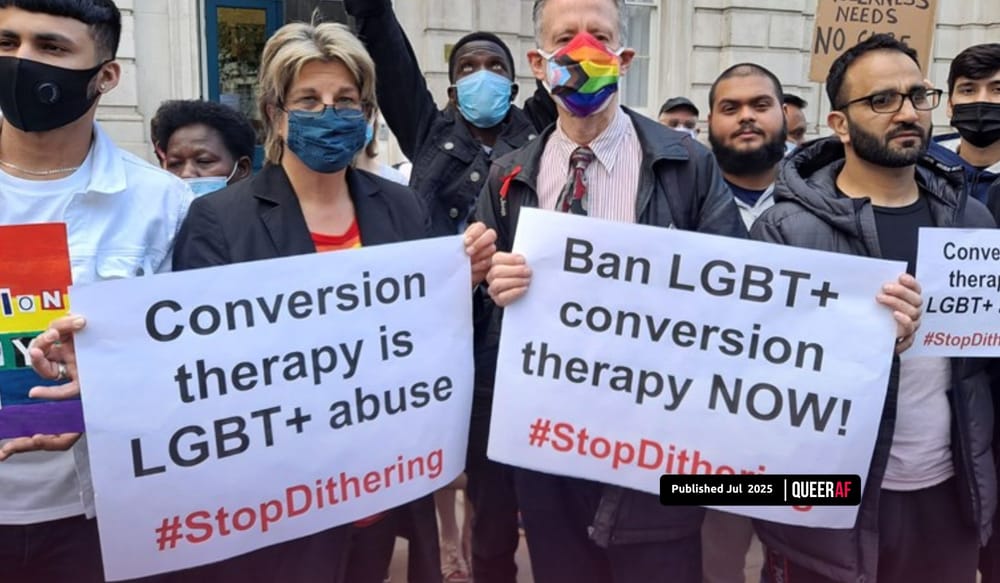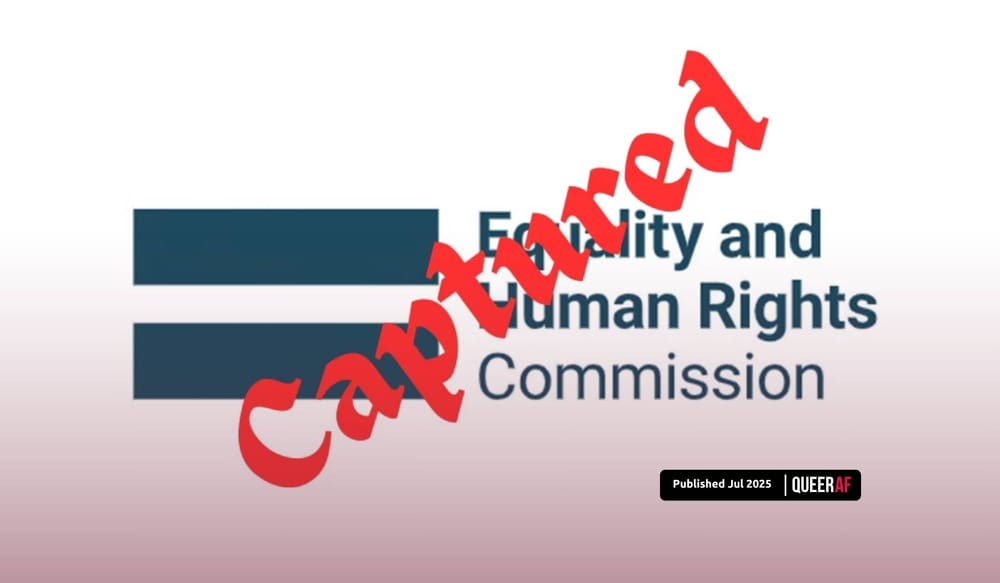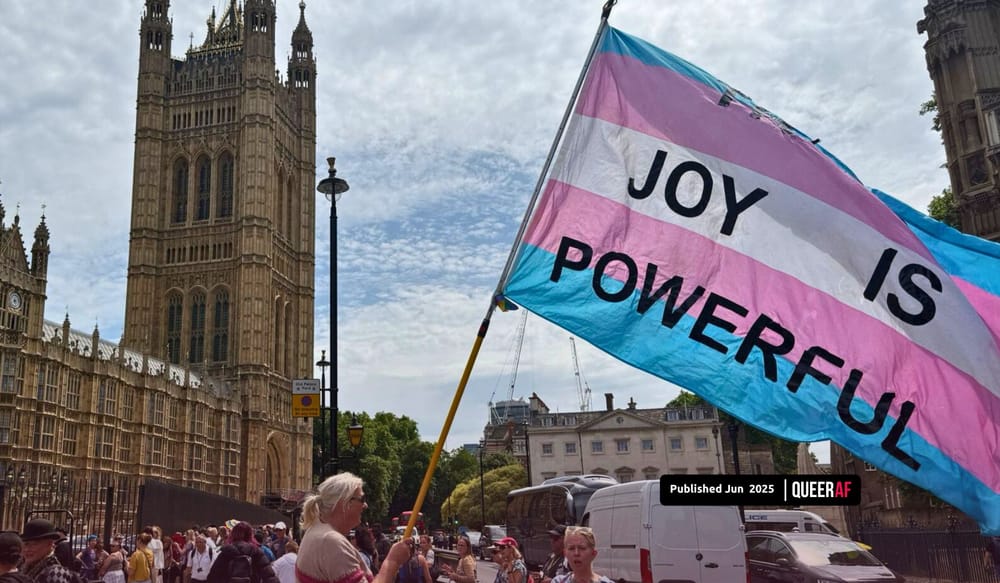
TL;DR: Following the u-turns on conversion therapy, the Government's LGBT Conference 'Safe To Be Me' fell apart after a massive boycott. Now the PM and Health Secretary have used transphobic dog whistles and created huge damage.
Since day one of Boris Johnson's premiership, when he kicked trans reforms into the long grass, we knew transgender rights were not on his agenda.
But this week, there was a significant shift in Government rhetoric. It confirmed what so many of us already knew. And now it's out in the open, and went largely unchallenged - we're only going to see more of it.
Transgender people became an official "political football", with many now feeling discussion of trans lives is being used to distract and divide. This amid a cost of living crisis, headlines about the Chancellor's wife's tax avoidance and a rise in National Insurance.
The Prime Minister marked this shift with a simple phrase: 'biology matters.' It's a transphobic dog whistle with little scientific meaning. After all, many trans people take hormones, which changes their biology.
But given he was speaking from a hospital on the day of a tax rise, you do have to wonder why journalists - who would have only had minutes to speak to the PM - asked about trans athletes to inspire these comments instead.
Earlier that day, Health Secretary Sajid Javid wrongly linked trans people and victims of child abuse. Javid was blasted for the comments - there is no evidence the two are connected.
Before all of this, the PM and Ministers simply didn't anything about trans people. And perhaps, for LGBTQIA+ campaigners, it helps to have these views on record, and out in the open.
But that’s little consolation when much of the media coverage fails to address false government claims with due balance and critique. For many, they'll be harking back to days when nothing was said as a time of solace.
And as Zoe Williams argues in The Guardian, none of this came about from journalists this week because they wanted to put a policy in the spotlight - “it’s a quest for the ‘gotcha’ moment, the inescapable trap of deliberately twisted logic”.
We learn so many of our norms from the media, whether we realise it or not. If something is repeated enough times, our brains are hard-wired to remember it. That's why the PM and Health Secretary's comments were so shocking this week.
Their claims will loom large in the minds of the many people listening at home who don't understand the nuances of trans lives. That's damage that will take years to undo.
We need a change in the media. Join the movement to make it possible with our free newsletter that supports queer creatives.
This all came as the International LGBT 'Safe To Be Me' conference fell apart. It faced a massive boycott, including from international queer organisations. In the end over 175 UK LGBTQIA+ organisations - including QueerAF - withdrew their support.
That was set off by a double U-turn, the kind of manoeuvre that only a Conservative government could pull off. Trans people were excluded from a ban on Conversion Therapy - after the whole ban was nearly entirely dropped despite four years of promises.
While all of this is going on, the headlines have been obsessed with one thing: the so-called 'culture war'. The growing anti-trans culture at the Equality Watchdog EHRC saw them issue advice that trans people can be banned from public bathrooms. A growing number of legal experts now believe this advice won't stand up in court and could contravene the Equality Act.
All of this is having a devastating impact on the fragility of trans lives - as Ugla Stefania writes in this week's Queer Gaze.
Speaking to trans friends and colleagues, it's clear just how scary it is to wake up to this kind of news each day. Each day they wonder what part of their lives will be debated and curtailed next.
The world is watching as the UK Government encourages rising transphobia. They are shocked that a country that has long professed to be a flagship of human rights is descending into troubled waters.
But there is solace to be found amongst all this. If we choose our words carefully and the fill media with the story that does need to be told, we can change the narrative
Take a look at how Emily Thornberry, Labour's Shadow Attorney General, turned a grim question on LBC about genitals into an answer about values we all share: the right to decent healthcare, safety and security.
“Women who are trans deserved to be recognised, and therefore yes, some of them will have penises. But, I’m not looking up their skirts, I don’t care. What I care about is making sure they’re looked after properly and not used as a political football by a Prime Minister who ought to know better.”
This was just one part of our free (award-winning) weekly newsletter with a summary of the queer world, bursting with LGBTQIA+ content - that supports underrepresented queer creatives.

I started QueerAF to fund queer media careers.
Behind the scenes, we are supporting underrepresented and emerging queer creatives to kickstart and build their media career.
This, while we build a community-centred platform that works for our community, not advertisers. We commission content for our free weekly newsletter because it counts, not for clicks.
We need to support a new generation of queer voices who can change the media.
Will you join QueerAF members like comedian Joe Lycett and the MD of Forbes in Europe, and National Student Pride's founder to make that possible?













